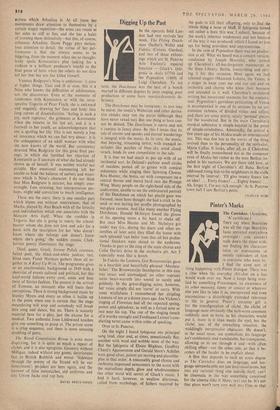Digging Up the Past
The Dutchman may be immature: its text may be naïve; the music's Weberian and other deriva- tive streaks may vex the purist (although they have never vexed me). But one thing at least can- not be denied. The Dutchman is opera and not a cantata in fancy dress. By this I mean that its tale of storms and spooks and eternal wanderings is integral with the music. In its turn, the music, that heaving, streaming terror, with tranquil in- terludes like patches of blue sky amid cloud- wrack, lends its own compulsion to the tale.
It is true we had much to put up with of an incidental sort. In Daland's parlour small circles of maidens peeled off to gyrate with comical sedateness while singing their Spinning Chorus. Rita Hunter, the Senta, sat with composure on a central throne and stared hard into the Prompt Wing. Many people on the right-hand sidQ of the auditorium, unable to see the embrasured portrait of the Dutchman on which her placid gaze was focused, must have thought she had a crick in the neck or was having her profile photographed by wet-plate camera. And like many another Flying Dutchman, Donald McIntyre found the gloom of his opening scene a bit hard to shake off. But once Miss Hunter and Mr. McIntyre got under way (i.e., during the duets and other en- sembles of later acts) they filled the house with such splendid 'can belto' tone that all but profes- sional finickers were elated to the eyebrows. Thanks in part to the zing of the male chorus and Colin Davis's drive in the orchestra pit, Act 3 especially went like a bomb.
In Fidelio the Leonora, Gre Brouwenstijn, gave us a heartfelt and beautifully phrased 'Abscheu- licher.' The Brouwenstijn thumbprint in this case was intact and unsmudged; no other soprano turns heart-warmth into sound so surely and goldenly. In the grave-digging scene, however, her voice simply did not 'curve' or carry. With some wistfulness I remembered her stripling Leonora of ten or a dozen years ago. Jon Vickers's singing of. Florestan had all the expected spring, power and splendour, as well as a forced note or two near his top. The rest of the singing (much of it worthy enough) and Ferdinand Leitner's con- ducting never came within miles of sparking.
Over to St. Pancras.
On the night I heard Iphigenia one principal sang loud, clear and, at times, sensationally flat; another with wool and wobble most of the way. But the Iphigenia of Elaine Blighton, Geoffrey Chard's Agamemnon and Gerald Stern's Achilles were good silver, potent yet moving and plausible- plus in that order. A reasonably good chorus and orchestra impressed newcomers to the score with the marvellous depth, glow and wholesomeness (no other word will serve) of Gluck's music. I find it hard, however, to swallow dilemmas, culled from mythology, of fathers required by the gods to kill their offspring, only to find the whole thing a tease or bluff. If Iphigenia turned out rather a bore this was, I submit, because of the work's inherent weaknesses and not because of the way it was produced, which I found no less apt for being provident and unpretentious.
In the case of Pygmalion there was no produc- tion at all. What we heard was a concert version, conducted by Joseph Horovitz, who turned up Cherubini's all-but-forgotten manuscript in the State Library, Berlin, transcribing and edit- ing it for this occasion. Here again we had talented singers (Maureen Lehane, the Venus, is a singer to keep your ear and eye on) and an orchestra and chorus who knew their business and attended to it well. Cherubini's orchestral writing has occasional moments for the connois- seur. Pygmalion's garrulous petitioning of Venus is accompanied in one of its sections by an, un- common richness of divided violas and cellos; and there aressome pretty, nicely 'permed' pieces for the woodwind. But in the main Cherubini's musical substance is simple-hearted to the point of simple-mindedness. Admittedly, the revival a few years ago of his Medea made an international stir. This was due less to the merits of the thing revived than to the personality of the revivalist, Maria Callas. It looks, after all, as if Cherubini will be finally remembered not as the composer even of Medea but rather as the man Berlioz im- paled in his memoirs. We are there told how, at the first night of Cherubini's All Baba, Berlioz addressed rising bids to his neighbours in the stalls interval :by interval: 'I'll give twenty francs for an idea! ... Forty francs! ... Eighty francs! ... Ah, forget it, I'm not rich enough.' At St. Pancras town hall I saw Berlioz's point.








































 Previous page
Previous page